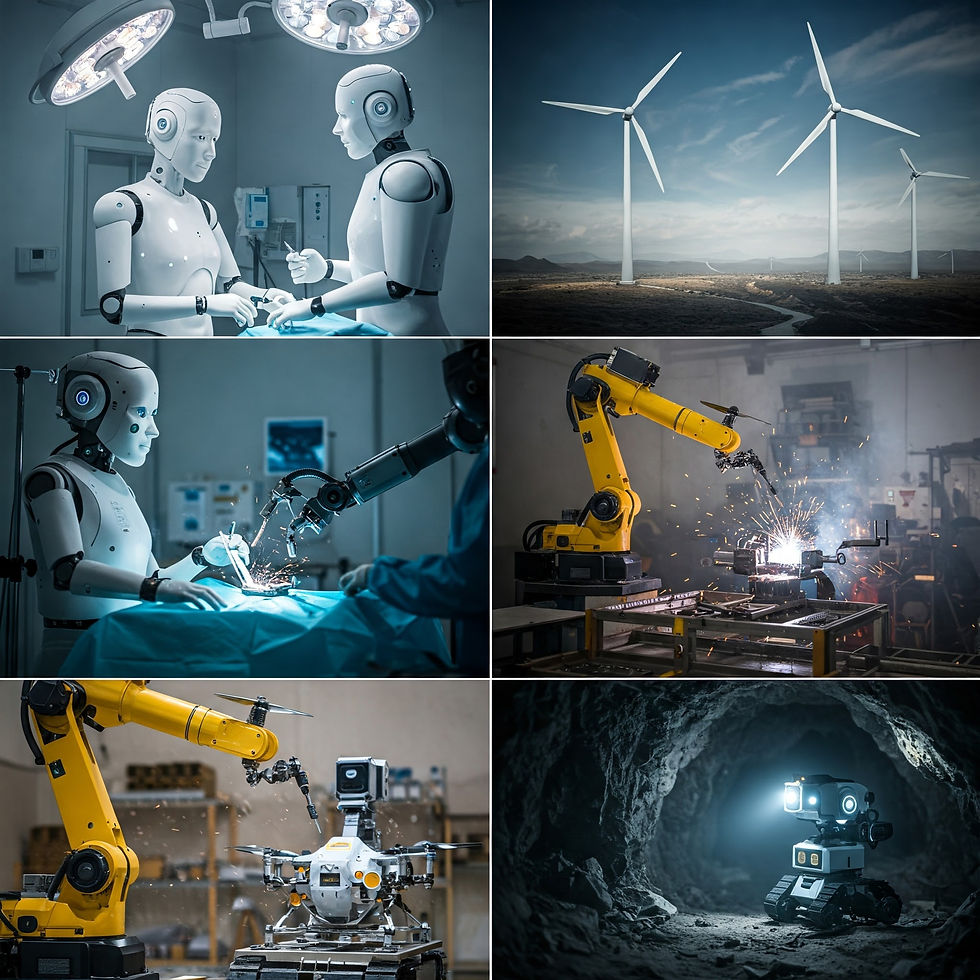Robotics
- Tretyak
- Mar 3, 2024
- 3 min read
Updated: Mar 10
Beyond the Assembly Line: The Dawn of the Intelligent Robot
Robotics transcends the mere creation of mechanical devices; it's an intricate dance of engineering, computer science, and Artificial Intelligence, culminating in the development of intelligent machines capable of interacting with and manipulating their environment. Let's embark on a comprehensive exploration of robotics, delving into its core components, diverse applications, and the ethical considerations that accompany its advancement.
I. Core Components: The Anatomy of a Robot
Sensors:
Description: Devices that allow robots to perceive their environment, gathering data about their surroundings.
Detailed Functionality:
Vision Sensors (Cameras, LiDAR): Capture visual information, enabling object recognition, obstacle avoidance, and navigation.
Tactile Sensors: Provide robots with a sense of touch, enabling them to grasp objects and detect contact.
Proximity Sensors (Ultrasonic, Infrared): Detect the presence of objects within a certain range.
Inertial Measurement Units (IMUs): Measure a robot's acceleration and orientation.
Impact: Enables robots to perceive and interact with their environment in a meaningful way.
Actuators:
Description: Devices that convert energy into motion, enabling robots to move and manipulate objects.
Detailed Functionality:
Electric Motors: Provide precise and controlled motion.
Hydraulic Actuators: Generate high forces for heavy-duty applications.
Pneumatic Actuators: Provide fast and efficient motion for repetitive tasks.
Impact: Enables robots to perform physical tasks with precision and power.
Controllers:
Description: The "brain" of the robot, responsible for processing sensor data and controlling actuators.
Detailed Functionality:
Microcontrollers: Small, embedded computers for simple robotic systems.
Industrial PCs: High-performance computers for complex robotic applications.
Robotic Operating Systems (ROS): Software frameworks that provide tools and libraries for robot development.
Impact: Enables robots to execute complex tasks and adapt to changing conditions.
Artificial Intelligence (AI):
Description: Enables robots to learn, reason, and make decisions, enhancing their autonomy and adaptability.
Detailed Functionality:
Machine Learning (ML): Trains robots to recognize patterns and make predictions from data.
Computer Vision: Enables robots to interpret visual information.
Reinforcement Learning (RL): Trains robots to learn through trial and error.
Impact: Enables robots to perform complex tasks, navigate unpredictable environments, and collaborate with humans.

II. Diverse Applications: Robots in Action
Industrial Automation:
Description: Robots automate manufacturing processes, improving efficiency, quality, and safety.
Detailed Functionality: Assembly line automation, welding, painting, and material handling.
Impact: Increased productivity, reduced costs, and improved product quality.
Healthcare:
Description: Robots assist surgeons, deliver medications, and provide rehabilitation therapy.
Detailed Functionality: Surgical robots, medical delivery robots, and rehabilitation robots.
Impact: Improved surgical precision, reduced patient recovery time, and enhanced patient care.
Logistics and Warehousing:
Description: Robots automate warehouse operations, such as sorting, picking, and packing.
Detailed Functionality: Autonomous mobile robots (AMRs), robotic arms, and automated storage and retrieval systems (AS/RS).
Impact: Increased efficiency, reduced labor costs, and improved order fulfillment.
Exploration and Hazardous Environments:
Description: Robots explore deep-sea trenches, distant planets, and hazardous environments.
Detailed Functionality: Underwater robots, planetary rovers, and bomb disposal robots.
Impact: Access to inaccessible environments, enhanced scientific discovery, and improved safety.
Service Robotics:
Description: Robots provide services in various settings, such as hospitality, retail, and healthcare.
Detailed Functionality: Cleaning robots, delivery robots, and customer service robots.
Impact: Improved efficiency, enhanced customer experience, and reduced labor costs.
Agriculture:
Description: Robots are used for planting, harvesting, and monitoring crops.
Detailed Functionality: Automated tractors, drones, and robotic harvesters.
Impact: Increased crop yields, reduced pesticide usage, and improved farming efficiency.

III. Ethical Considerations: Navigating the Robotic Frontier
Job Displacement:
Description: The potential impact of automation on employment and the need for workforce retraining.
Considerations: Strategies for mitigating job losses and creating new opportunities.
Safety and Security:
Description: Ensuring the safety of humans and robots in shared environments and preventing malicious use of robots.
Considerations: Development of safety standards, cybersecurity measures, and ethical guidelines.
Autonomous Weapons Systems:
Description: The ethical implications of developing robots capable of making autonomous decisions about lethal force.
Considerations: International treaties, ethical debates, and the need for human control.
Bias and Discrimination:
Description: Preventing robots from perpetuating or amplifying existing biases in data and algorithms.
Considerations: Data diversity, algorithmic fairness, and ethical design principles.
Privacy:
Description: Robots equipped with sensors can collect large amounts of data, creating privacy concerns.
Considerations: Data anonymization, data security, and clear data usage policies.

IV. Future Directions: The Evolving Landscape of Robotics
Human-Robot Collaboration (Cobots): Seamless integration of robots and humans in shared workspaces.
Soft Robotics: Development of robots with flexible and adaptable bodies.
Bio-Inspired Robotics: Designing robots based on biological systems and principles.
Swarm Robotics: Coordinating large groups of robots to perform complex tasks.
Explainable AI (XAI) in Robotics: Making robot decision-making more transparent and interpretable.
Robotics is a dynamic and transformative field, reshaping industries and redefining the boundaries of human-machine interaction. By understanding its core components, diverse applications, and ethical considerations, we can harness the power of robotics to create a more efficient, sustainable, and equitable future.















































































































Robotics is such a fascinating field! It's amazing to see the advancements happening – self-driving cars, robotic assistants, and even robots exploring space. I'm curious to see how robotics will continue to shape our world in the years to come.